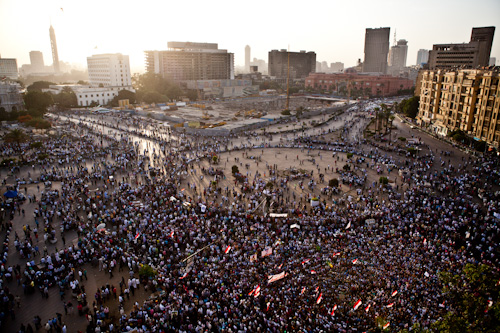The Revolution Continues Coalition is competing for more than 50 percent of seats in the upcoming parliamentary elections, scheduled to start 28 November.
The coalition is comprised of the 25 January Revolution Youth Coalition and six other parties. It was formed a week ago after a number of parties withdrew from the two big electoral coalitions – the Democratic Alliance and Egyptian Bloc – in protest that they were fielding members of the dissolved National Democratic Party (NDP) as candidates.
The new coalition is fielding 270 candidates on party lists and about 20 individual candidates to compete for seats in the 504-seat lower house, Marwa Farouk, a member of the Socialist Popular Alliance Party's general secretariat, told Al-Masry Al-Youm. This is in 34 electoral districts across 21 of Egypt’s governorates, she added.
As for the Shura Council – or upper house – elections, the coalition is competing for 32 seats through the list-based system, along with 10 individual candidates.
Farouk added that 60 of the candidates are women and more than 50 percent are young people who participated in the 25 January uprising.
While more than 50 percent of the coalition's candidates belong to the leftist Socialist Popular Alliance Party, the coalition includes parties from all of Egypt’s political spectrum, from the extreme left to the right, as well as Islamists.
“A main goal behind this coalition is to challenge the polarization of political forces and to revive the spirit of Tahrir Square, which brought together people from different backgrounds and ideologies,” said Shahir Goerge Ishaq, a member of the liberal Freedom Egypt Party and a parliamentary candidate.
Although the coalition contains diverse, conflicting ideologies, Ishaq doesn’t see this as hindering its chances of electoral success.
“This is a time of national consensus. We believe that different political forces can indeed unite on basic ideas that serve the betterment of the country,” said Ishaq.
According to Khaled Abdel Hamid, a member of the 25 January Revolution Youth Coalition, there are three main principles that the coalition’s campaign will uphold.
“First, the revolution is not over yet. The Mubarak regime didn’t completely fall down and the corrupt people are still ruling the country,” he said, adding that the coalition aims to work on ending the transitional period, with the Supreme Council of the Armed Forces (SCAF) transfering power as soon as possible.
The second principle is social justice, which was an integral demand of the revolution. This includes setting a minimum and maximum wage, obtaining freedom for labor syndicates, and providing enough job opportunities, said Abdel Hamid.
The third principle is the rejection of any person who was directly or indirectly associated with the NDP or the old regime.
The Islamist Egyptian Current Party is the only Islamist party in the coalition. It was formed by a number of young former Muslim Brotherhood members who revolted against the autocratic leadership of the Islamist group, which is also widely accused of forging an agreement with the country’s military rulers.
According to Farouk, the Egyptian Current Party's founders had clear positions in supporting the revolution’s demands and in opposing the Muslim Brotherhood from the beginning, which is why they belong to the coalition.

